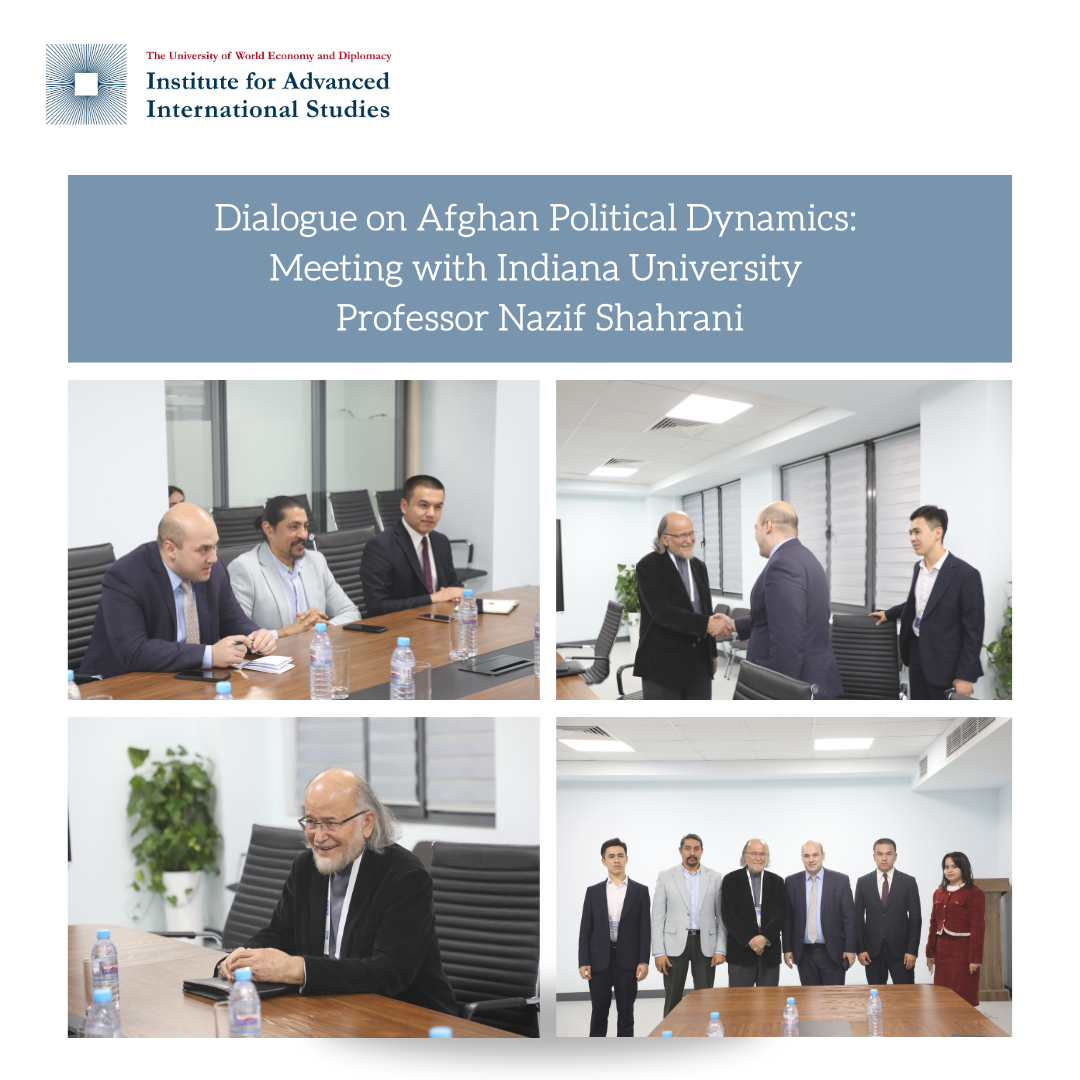
On 25 October, the University of World Economy and Diplomacy (UWED) welcomed an important visit from Professor Nazif Shahrani of Indiana University, Bloomington, USA. Prof. Shahrani met with UWED’s First Vice-Rector, Dr. Akram Umarov, along with the staff of the Institute for Advanced International Studies, including Hamza Boltaev, Head of the Centre for Afghanistan and South Asian Studies, and Research Fellow Odilbek Manabov. The dialogue underlined UWED’s ongoing commitment to international academic cooperation and provided a platform for the exchange of perspectives on Afghanistan’s current political climate and strategic future.
Dr. Umarov opened the meeting by presenting an overview of UWED’s educational system, underscoring the institution’s efforts to expand its academic capacity and enhance student competencies. He detailed UWED’s initiatives aimed at cultivating a globally minded and well-prepared student body, equipped to address complex international challenges. His remarks highlighted University’s long-term vision for growth and strategic improvements in academic standards and research capabilities, particularly in areas of global significance like Afghanistan.
Professor Shahrani, in turn, expressed keen interest in Afghanistan’s evolving political environment, discussing his forthcoming engagement in an Afghan assembly to be held in Istanbul from 31 October to 1 November. This gathering, hosted by Afghanistan’s Deputy Foreign Minister Hekmat Khalil Karzai, is expected to attract a diverse representation, including members of the Taliban, to address Afghanistan’s developmental trajectory. Professor Shahrani elaborated on the potential for this Istanbul meeting to set the groundwork for future cooperation among Afghan political factions, with a primary focus on creating a unified roadmap for the country’s stability and prosperity.
A significant part of the conversation centred on Afghanistan’s political culture, with Professor Shahrani offering nuanced insights into the historical and socio-political dynamics that influence contemporary Afghan politics. He emphasised the importance of developing a forward-looking agenda, designed to resonate with the aspirations of the Afghan populace and to support inclusive governance structures. In addition, Professor Shahrani underscored the need to formulate a well-structured roadmap that can bridge political divides within the country and promote a peaceful, self-reliant Afghanistan.
The discussion also delved into the critical issue of engaging with the Taliban, particularly regarding the Trans-Afghan Corridor project. This initiative, which aims to bolster economic connectivity and trade routes across the region, was examined as a pivotal opportunity for regional stability and growth. Both parties considered the potential economic and diplomatic impacts of this corridor, noting the importance of cooperation between Afghanistan and neighbouring countries to realise its benefits fully. Such connectivity initiatives, they agreed, could provide Afghanistan with a much-needed economic lifeline and foster broader regional integration.
Concluding the meeting, both sides expressed a mutual intent to maintain regular dialogues and collaboration in research initiatives. This engagement holds promise for strengthening UWED’s research expertise on Afghanistan, a focal area of geopolitical and economic significance. As a testament to his commitment to this partnership, Professor Shahrani also delivered a lecture at UWED on 26 October, providing students with a unique opportunity to gain insight into Afghanistan’s intricate political issues and to engage in discussions on regional stability.
This meeting underscored UWED’s dedication to fostering dialogue on pressing international issues and enhancing the academic depth of its programmes, with Afghanistan as a particular area of focus. The institution continues to play a role in bridging global expertise and regional understanding, thereby contributing to the broader discourse on Afghanistan’s political future and regional connectivity initiatives.